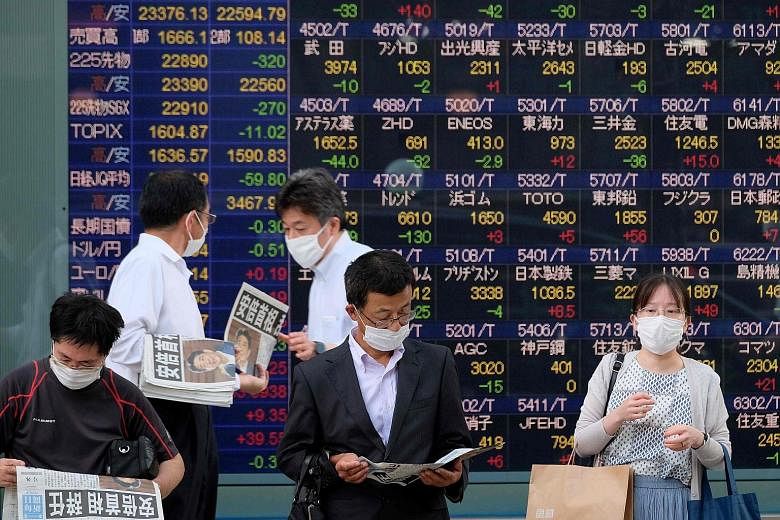TOKYO • Japanese shares fell yesterday by their most in almost a month on news that Prime Minister Shinzo Abe will resign, bringing an abrupt end to his stable government and policy mix of aggressive monetary and fiscal stimulus dubbed Abenomics. The Nikkei share average sank 2.65 per cent at one point before closing 1.41 per cent lower at 22,882.65.
"The Nikkei will likely head to around 21,000, a level where its price-to-book ratio will be 1.0," said Mr Takatoshi Itoshima, a strategist at Pictet Asset Management. "Japanese stocks tend to do well under a long, stable government and that was especially the case for Abe. Foreign investors may also worry what will happen to the relationship between the government and the Bank of Japan (BOJ)."
Mr Abe, Japan's longest serving premier, announced after Tokyo markets closed that he would resign due to his worsening health after almost eight years in the office, confirming earlier media reports.
His aggressive stimulus and close collaboration with the central bank have helped to revitalise Japanese shares, with the Nikkei reaching a 27-year high in 2018.
"The market has rebounded a bit for now, but I think we need to be cautious, going into next week," said Mr Shingo Ide, chief equity strategist at NLI Research Institute.
"Whoever succeeds him, it will be tough to garner strong support and political uncertainties will likely weigh on markets."
The broader Topix lost 0.68 per cent to 1,604.87, with turnover rising to a more than two-month high of 2.83 trillion yen (S$40 billion).
The yen, considered a safe haven in times of uncertainty, rallied against the US dollar. The currency, which had fallen to a two-week low of 106.945 to the dollar, rose on the news to as strong as 106.025 at 0717 GMT (3.17pm Singapore time). By 0735 GMT, it had eased slightly to 106.06.
"Resignation brings into question support for Abenomics and, of course, support for BOJ governor Haruhiko Kuroda's ultra-easy policy," said Mr Rodrigo Catril, senior foreign exchange strategist at National Australia Bank in Sydney, who sees the yen at 103 against the dollar by year-end.
ING strategists wrote in a note to clients that "Abenomics" was one of the key factors in yen weakness in previous years. But, they said, what matters most for the yen is the BOJ's stance and that it is too early to say whether Mr Abe's resignation would materially impact the central bank.
"Nonetheless, concerns about the post-Abe shift in the policy stance add to our bearish US dollar to yen outlook (we target 102 by year-end), though we continue to see dollar weakness as the main driver of the cross," ING added.
At the virtual Jackson Hole conference on Thursday, Federal Reserve chairman Jerome Powell said the United States central bank would seek to keep inflation at 2 per cent, on average, so that periods of too-low inflation would likely be followed by an effort to lift inflation above 2 per cent for some time. In practice, market participants expect that this means the current ultra-low US rates will stay lower for longer.
The dollar fell to as low as 92.418 versus a basket of currencies while Mr Powell was speaking, then quickly recovered. But it started to slide again overnight, extending losses in early London trading.
At 0726 GMT, the dollar index was at 92.477, down 0.6 per cent on the day and almost as low as it was in the initial sell-off on Thursday.
REUTERS, BLOOMBERG

